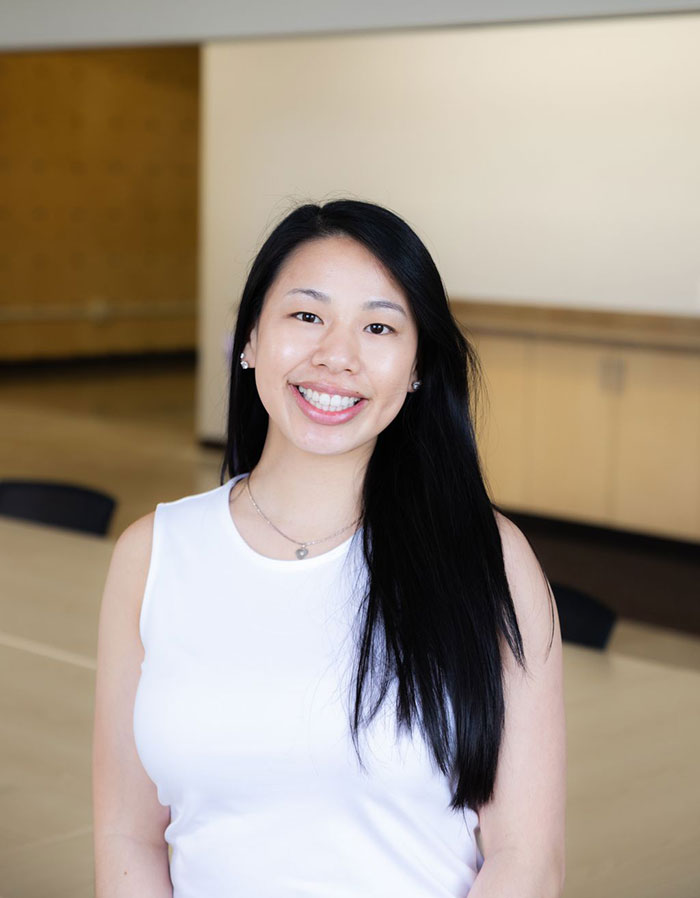
For nutrition science graduate student Isabelle Haeberly, a seven-week rotation at a long-term care facility provided her with insight that will last a lifetime.
Haeberly worked at the facility in the Syracuse area as part of her “supervised experiential learning” (SEL) requirement needed to receive her master’s degree. Haeberly emerged from her long-term care experience recognizing that the lessons she learned there will translate to any work environment she chooses.
“This rotation emphasized learning agility–the ability to take knowledge from one setting and apply it to another,” Haeberly says. “While long-term care may not be my ideal work environment, the critical thinking, attention to detail, individualization of interventions, and interdisciplinary collaboration I developed will translate into any area of dietetics.”
In SEL settings, students work under the supervision of a preceptor, who is generally a registered dietitian. In a reflection that Haeberly wrote following her long-term care facility SEL, it was clear how deeply Haeberly was impacted by her preceptor and other healthcare professionals at the facility.
“The language of passion is universal regardless of profession with the commonality of wanting to get better at your craft,” Haeberly wrote.
We asked Haeberly, who received her bachelor’s degree in exercise science from Falk College in 2023, to share her reflection with us and here’s what she wrote about her experience this winter:
“During my seven-week rotation at the long-term care facility, I gained valuable insight into the complexities of geriatric nutrition. This experience greatly deepened my appreciation for life in a way I don’t think any other experience could have. It brought to light the fact that health can decline rapidly. In this setting in particular, it highlighted how social isolation plays a major role in the health of residents and how family support makes a huge difference. I also observed firsthand how chronic pain contributes to behavioral changes, often mistaken for personality traits such as the stereotypical ‘old people are cranky.’ Overall, this rotation added a new perspective to how I view the world, and it made me realize just how short life is.
“Working with my preceptor, I strengthened my nutrition assessment skills and competence in reading medical records, and learned to apply my medical nutrition therapy coursework in a clinical setting. I also witnessed how dietitians function as detectives, collaborating with speech-language pathologists, nurses, and social workers to piece together accurate information and develop appropriate individualized interventions.
“One exceptional nurse manager’s attention to detail and passion for her profession set a high standard for patient care–one which everyone should strive for regardless of which healthcare profession they are in. This was one of my main takeaways. The qualities this nurse manager demonstrated showed me how much you can learn from professions other than your own.
“This experience provided me with valuable skills that will benefit me in my future as a dietitian, regardless of the setting I choose. It helped me gain confidence in my ability to learn quickly through hands-on experience and in my ability to adapt and even excel when thrown into a situation or position. It also greatly improved my confidence in my skills writing nutrition assessments and I got to see how my attention to detail helped me do well with the responsibilities in this type of dietetic role. This is a skill that will serve me in any area of dietetics.”
Isabelle Haeberly earned her bachelor’s degree in exercise science from Falk College in 2023. This academic year, Haeberly, Greta Smith, and Cassidy Mosher were recipients of the Ann Selkowitz Litt Memorial Scholarship from the Academy of Nutrition and Dietetics Foundation. The annual Ann Selkowitz Litt Distinguished Speaker Series was held April 1 in Falk College.

The Path to RD/RDN
As of January 2024, dietitians are required to hold a master’s degree, so the Department of Nutrition and Science and Dietetics in Falk College modified its program into a two-year graduate level program in which students complete the requirements for their degree in nutrition science and all of the SEL requirements in a comprehensive program.
The program’s accreditation standards require that students gain experience with patients/clients who require certain medical nutrition therapy, range across the lifespan, and are from diverse backgrounds. The program provides students with four rotations in different settings: acute care, long-term care, community education and counseling, and food service management.
Nicole Beckwith, director of the Master of Arts in Nutrition Science program, served as a preceptor for the program for 13 years and says the support the program receives from preceptors–many of whom are Syracuse University and Falk College alumni–is integral to its success. April is National Preceptor Month, and in Falk’s program Beckwith says preceptors provide 8,000 hours of mentorship during an academic year for a fully enrolled class of 12 students.
“The importance of preceptors who are willing to welcome students into their workspace to provide mentorship is critical to our profession,” Beckwith says. “We seek to build strong relationships with our preceptors and support them through training opportunities, frequent communication, and appreciation gestures. Without preceptors, we have no programs and no profession.”
Once master’s students meet their SEL requirements, they are eligible to take the credentialing exam to become a registered dietitian/registered dietitian nutritionist (RD/RDN). They must pass the exam to become an RD/RDN, which can be used interchangeably. Visit the Nutrition Science and Dietetics website to learn more about academic programs and career opportunities.
